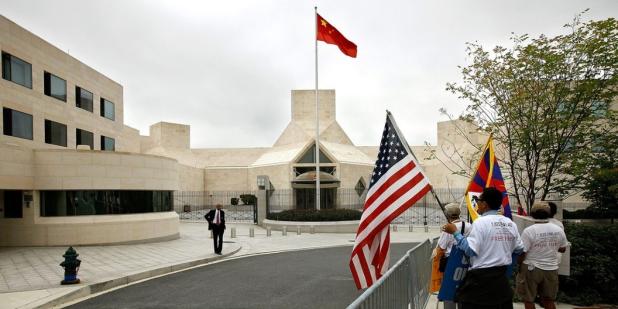Join us for a free one-day workshop for educators at the Japanese American National Museum, hosted by the USC U.S.-China Institute and the National Consortium for Teaching about Asia. This workshop will include a guided tour of the beloved exhibition Common Ground: The Heart of Community, slated to close permanently in January 2025. Following the tour, learn strategies for engaging students in the primary source artifacts, images, and documents found in JANM’s vast collection and discover classroom-ready resources to support teaching and learning about the Japanese American experience.
When Beijing Goes to Washington: Estimating Autocratic Lobbying Influence in Democracies
Please join the USC U.S.-China Institute for a discussion with Professor Erin Baggott Carter to look at how autocratic lobbying affects political outcomes and media coverage in democracies.

How does autocratic lobbying affect political outcomes and media coverage in democracies? This presentation focuses on a dataset drawn from the public records of the U.S. Foreign Agents Registration Act. It includes over 10,000 lobbying activities undertaken by the Chinese government between 2005 and 2019. Using a variety of statistical approaches, Prof. Carter finds that Chinese government lobbying makes legislators more likely to sponsor legislation that is favorable to Chinese interests. She concludes US media outlets that participated on Chinese-government sponsored trips subsequently covered China as less threatening. Coverage pivoted away from US-China military rivalry and the CCP’s persecution of religious minorities and toward US-China economic cooperation.
 Erin Baggott Carter (赵雅芬) is an assistant professor in political science and international relations at the University of Southern California. She is also a visiting scholar at Stanford's Center on Democracy, Development, and the Rule of Law. She earned her doctorate at Harvard University. Prof. Carter’s research focuses on Chinese politics and propaganda. She recently completed a book on autocratic propaganda based on an original dataset of eight million articles in Arabic, Chinese, English, French, Russian, and Spanish drawn from state-run newspapers in nearly 70 countries. She is now working on a book on how domestic politics influence US-China relations. She’s published widely in scholarly publications and her work has been highlighted in major news publications.
Erin Baggott Carter (赵雅芬) is an assistant professor in political science and international relations at the University of Southern California. She is also a visiting scholar at Stanford's Center on Democracy, Development, and the Rule of Law. She earned her doctorate at Harvard University. Prof. Carter’s research focuses on Chinese politics and propaganda. She recently completed a book on autocratic propaganda based on an original dataset of eight million articles in Arabic, Chinese, English, French, Russian, and Spanish drawn from state-run newspapers in nearly 70 countries. She is now working on a book on how domestic politics influence US-China relations. She’s published widely in scholarly publications and her work has been highlighted in major news publications.
Featured Articles
Please join us for the Grad Mixer! Hosted by USC Annenberg Office of International Affairs, Enjoy food, drink and conversation with fellow students across USC Annenberg. Graduate students from any field are welcome to join, so it is a great opportunity to meet fellow students with IR/foreign policy-related research topics and interests.
RSVP link: https://forms.gle/1zer188RE9dCS6Ho6
Events
Hosted by USC Annenberg Office of International Affairs, enjoy food, drink and conversation with fellow international students.
Join us for an in-person conversation on Thursday, November 7th at 4pm with author David M. Lampton as he discusses his new book, Living U.S.-China Relations: From Cold War to Cold War. The book examines the history of U.S.-China relations across eight U.S. presidential administrations.




